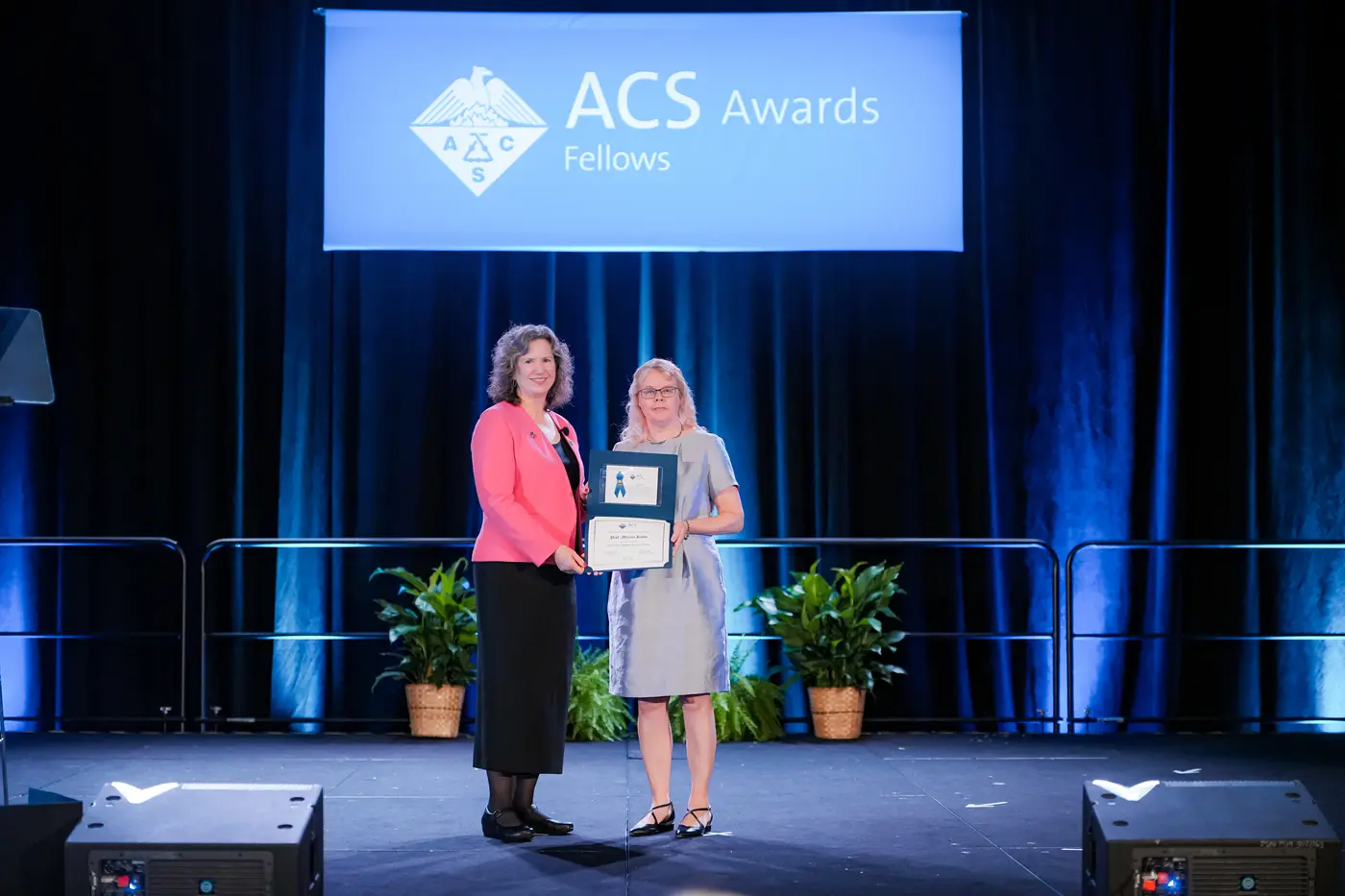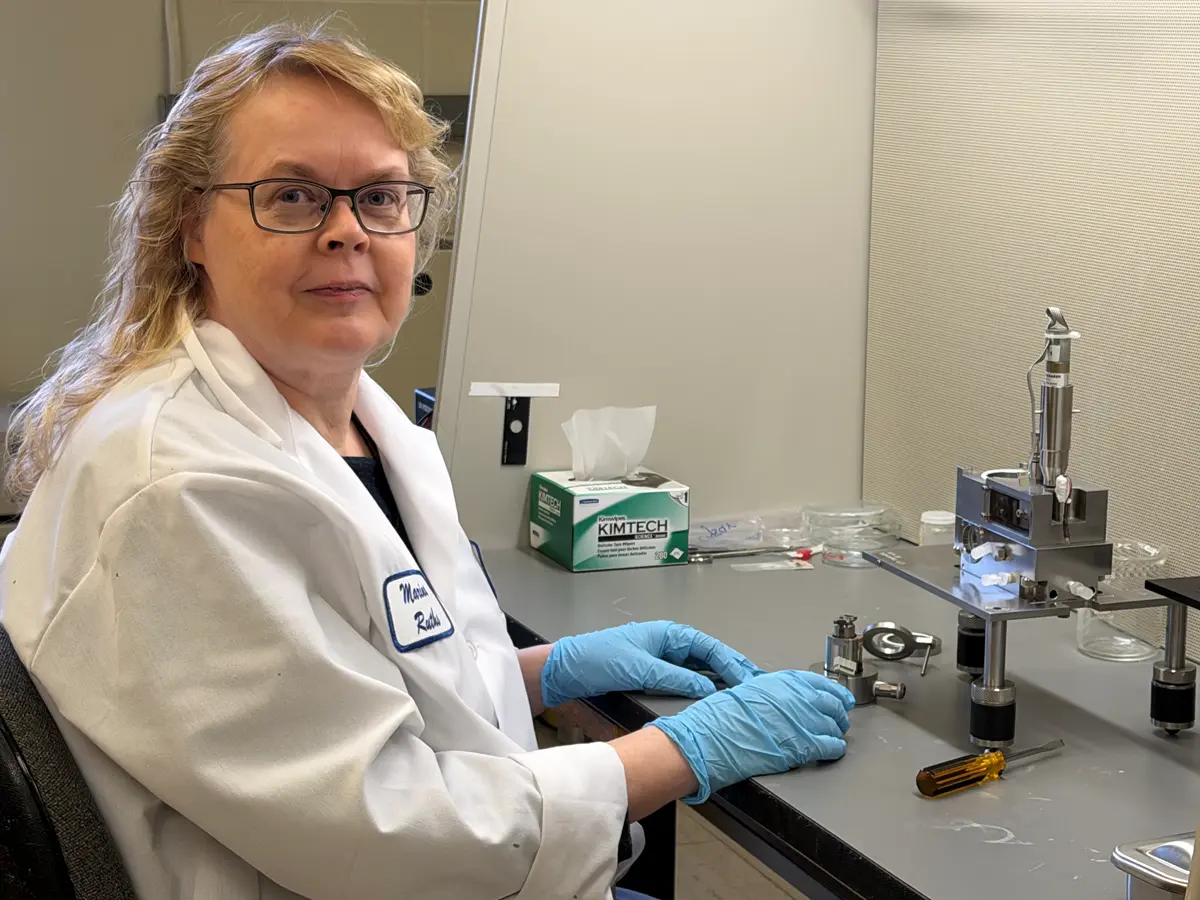 Image by EPNAC
Image by EPNAC
Chemistry Professor Marina Ruths, right, was recognized by the American Chemical Society for her research and her service to the organization.
Throughout her career, Chemistry Professor Marina Ruths has studied how substances stick or slide at the tiniest scales. Is it any wonder she believes that the smallest actions can help organizations, communities and even the human body run smoothly?
Ruths began her education in Finland, and an ASLA/Fulbright grant allowed her to continue her graduate studies in the United States. As a faculty member at UMass Lowell, she was recognized with a prestigious National Science Foundation CAREER Award to study how multiple points of contact interact to create friction on surfaces.
She was recently named a Fellow of the American Chemical Society (ACS) in recognition of her discoveries in nano- and microscale tribology, or friction studies, as well as her service to the society, which includes 11 years in various officer roles.
Ruths sat down to share how her research and service work together, and how the combination helped her join an accomplished group of colleagues.
How did you come to study physical chemistry and friction, adhesion and lubrication at nanoscale?
As an undergraduate, I had a summer job at the Åbo Akademi University department of physical chemistry. We studied self-assembled systems on the nanometer and micrometer scale. In those days, it was called colloid chemistry, but now the field has developed into nanomaterials, nanoparticles and the surface properties of different materials. I also was interested in other types of chemistry, but this turned out to be a good path for me. It conveniently became a hot topic.
 Image by courtesy
Image by courtesy
Marina Ruths' research on friction could lead to advances in treatments for osteoarthritis.
My interest in friction, adhesion and lubrication came later, during my Ph.D. studies at the University of California, Santa Barbara. My advisor there invented instrumentation to analyze frictional forces and lubrication problems on the nanometer and micrometer scale. I have that type of instrument in my own laboratory here now.
What intrigues you in your field now?
My friction research has expanded to what some people call biomimetic materials. In my case, they are “bio-inspired” systems; they are not real biological materials, but they can mimic biological properties. For example, the friction of tissue in the human body can be modeled this way. More specifically, the study of model systems for the friction and lubrication of the cartilage surface and synovial fluid of joints could lead to treatments for osteoarthritis.
There is also a trend towards bio-derived systems for environmental reasons, including water-based systems and lubricants that come from natural products. We are working on a lubrication system of fatty acids derived from agricultural products, as an alternative to petroleum-based products. We are doing investigations at a very basic level, looking at how different molecular structures affect friction properties. We don't have a specific commercial/practical system in mind or as a goal. Most likely, the fatty acids would be lubricants for metal surfaces, under conditions where the process does not reach really high temperatures.
What does being named a Fellow of the American Chemistry Society mean to you?
Some scientific societies look exclusively at your research accomplishments and name many fellows each year. The ACS has a requirement that is about 50% research and 50% service to the ACS. The ACS also limits the number of fellows to about 1% or 2% of the total membership. There were 36 of us who became fellows this year.
I am in the company of some very accomplished people. It makes me happy to be in that company.
Not only is your service to ACS extensive, but you’ve also served in several roles in the university community, including in the Faculty Senate and as a co-principal investigator for the grant that led to the Making WAVES initiative (Making Women Academics Valued and Engaged in STEM), which was incorporated into the ADVANCE Office for Faculty Equity & Resilience (OFER). What motivates you to do this work?
Some of it comes from curiosity. With the ADVANCE program, there were previous efforts at the university to work on the issues facing women in STEM (science, technology, engineering and mathematics). I went to those meetings because I was curious about what I could learn and whether I could contribute something. When the opportunity to apply for the grant came along, I was asked to join. I was not one of the people doing the actual social science research at the heart of that grant, but I was a liaison to the College of Sciences.
What about your service to ACS?
My service with the ACS is focused on one of their 32 technical divisions, the Division of Colloid and Surface Chemistry. I became involved to be better connected with the community where I felt I most belonged, both in my research interests and my professional interactions and friendships.
My involvement developed into something bigger than I originally planned. It is sometimes difficult to say no, and sometimes you see that you can make an impact. This was true in my first big role in the division, as treasurer. It was satisfying to get and keep things organized, to contribute to something.
I feel a level of responsibility toward an organization that has been my scientific home and supports my research field. My service became a way I give back for the opportunities I had as a researcher.
